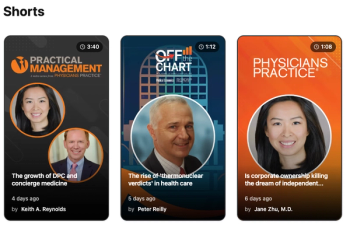
How physicians can give negative feedback
Providing negative feedback is different than discussing a bad prognosis with a patient.
Giving negative feedback can be one of the most difficult parts of any job. For most physicians, negative feedback is not part of patient care, but it can be part of working with staff and colleagues. Giving negative feedback is different than discussing a bad prognosis with a patient because negative feedback can be an associated sense of rejection and blame. While few doctors could actually enjoy the process of giving negative feedback, it can be a less dreaded interaction if it’s done with some thoughtful planning.
Establish roles and purpose
When you give negative feedback, the recipient of your assessment might push back by arguing that you are wrong or that you are not qualified to provide an opinion about their work. As a physician, before you provide your feedback in the work setting, it’s important to verify that you are in a position to give this type of appraisal. Whether you are formally supervising other doctors or assessing one of your peers, defining your roles and the need for the critique is a vital first step.
Perhaps your evaluation is scheduled, which can make the process easier. But if you are giving unscheduled feedback to a peer for the purpose of getting fair treatment for yourself, improving the process for your team, or responding to a patient care issue, you need to be clear about several things:
- Why this feedback is important
- Why you are the one who is giving the feedback
- Why feedback is needed at this time
- The overall purpose and desired outcome
The traditional sandwich still works
When it comes to negative feedback, using the 1/3 rule is a tried-and-true strategy, particularly for people who might be highly sensitive to criticism. Opening with praise, then clearly stating the criticism, and then closing with praise is a way to present the matter as being only one aspect of a person’s whole performance.
Sometimes, pointing out the positives can prompt a reassessment. It might lead to organizing assignments so that people can increase the amount of time they spend on tasks they are especially good at. If this is something that you and your whole medical team would consider to be productive, the complement/criticism sandwich might frame the situation for you and others to see how to better apply colleague talents.
Provide suggestions
An important aspect of feedback is giving suggestions for improvement. Sometimes the path to improvement is easy to see and spell out, but other times you might not have an idea of how a
person can improve. If the steps to fixing the problem are not clear, your colleague may need professional help. For example, a physician might benefit from a continuing medical education (CME) program with instructions covering the area of deficit. Or they might need a more comprehensive or personalized program to help them work through problems that are interfering with their work. Suggestions might not be simple, but it is a good idea to discuss actionable steps to remedy the situation at an early stage.
Show realistic belief in improvement
Being criticized can be overwhelming, even for physicians who seem to be confident. If you think your colleague can improve, it helps to directly tell them that you believe they can fix the problem. They might not be able to see their potential until you point it out to them.
Feedback about a deficit is usually about the action, not the person. This is the case most of the time. However, if you and colleagues are concerned that a peer physician or another health care professional might not ever be able to achieve the improvement necessary to provide good patient care, it could be beneficial to use objective measures to make this assessment and to find resources so they can find another path that doesn’t endanger patient safety.
Newsletter
Optimize your practice with the Physicians Practice newsletter, offering management pearls, leadership tips, and business strategies tailored for practice administrators and physicians of any specialty.






